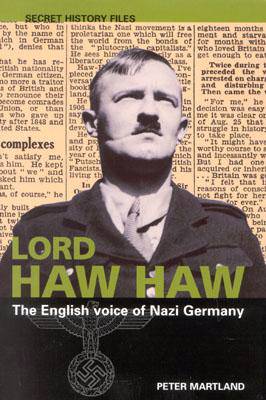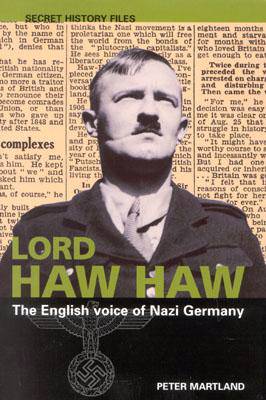
- Afhalen na 1 uur in een winkel met voorraad
- Gratis thuislevering in België vanaf € 30
- Ruim aanbod met 7 miljoen producten
- Afhalen na 1 uur in een winkel met voorraad
- Gratis thuislevering in België vanaf € 30
- Ruim aanbod met 7 miljoen producten
Zoeken
Lord Haw Haw
The English Voice of Nazi Germany
Peter Martland, The National Archives UK
Hardcover | Engels
€ 104,95
+ 209 punten
Omschrijving
Lord Haw Haw: The English Voice of Nazi Germany tells the story of William Joyce from a new angle: through the eyes of the British intelligence agents who pursued him from his teenage dalliance with fascism in the 1920s to his execution in 1946. The resulting files - and those on Joyce's wife Margaret, known as Lady Haw Haw - were kept secret for many years, but in 2000 were released to the UK National Archives. It is from these unique sources that this account of Joyce's life and personality is constructed. Featured documents range from broadcast transcripts to statements and correspondence from Joyce's family, friends and colleagues; from Joyce's official documents to his personal journal in the desperate days before his capture in May 1945. Along the way, many enduring questions about Lord Haw Haw are considered: - Why a man described as a nonentity was a threat to the British establishment. - How he captured the public's imagination to become universally loathed. - Why the authorities prosecuted when the documents published here prove they were aware of Joyce's American citizenship. - The circumstances that led to Joyce's execution when prosecution of his wife was waived on compassionate grounds.
Specificaties
Betrokkenen
- Auteur(s):
- Uitgeverij:
Inhoud
- Aantal bladzijden:
- 320
- Taal:
- Engels
Eigenschappen
- Productcode (EAN):
- 9780810847538
- Verschijningsdatum:
- 28/04/2003
- Uitvoering:
- Hardcover
- Formaat:
- Genaaid
- Afmetingen:
- 156 mm x 246 mm
- Gewicht:
- 839 g

Alleen bij Standaard Boekhandel
+ 209 punten op je klantenkaart van Standaard Boekhandel
Beoordelingen
We publiceren alleen reviews die voldoen aan de voorwaarden voor reviews. Bekijk onze voorwaarden voor reviews.











